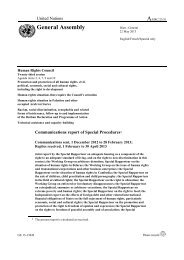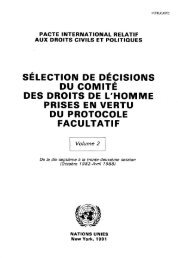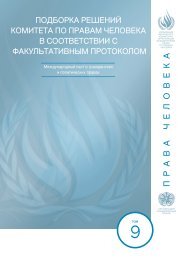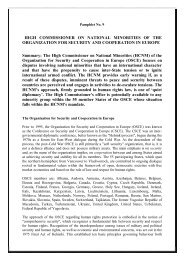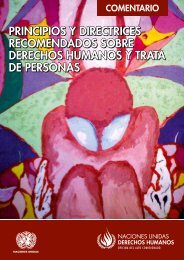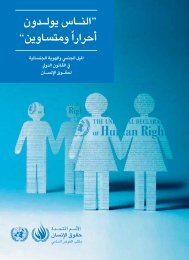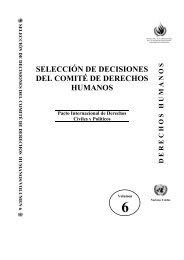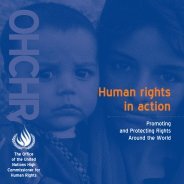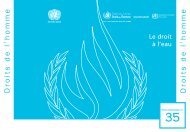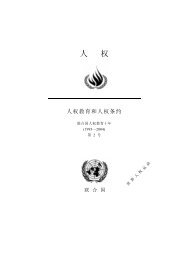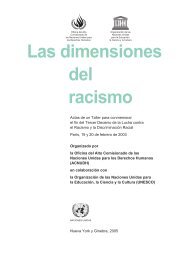good governance practices for the protection of human rights
good governance practices for the protection of human rights
good governance practices for the protection of human rights
Create successful ePaper yourself
Turn your PDF publications into a flip-book with our unique Google optimized e-Paper software.
ibery have been. Thirty ECAs from 28 OECD member States responded. The<br />
survey showed that ECAs began adopting some anti-corruption procedures, but<br />
that this ef<strong>for</strong>t was inconsistent across countries and not always comprehensive<br />
within <strong>the</strong> same country. For example, all but four ECAs now in<strong>for</strong>m applicants<br />
<strong>of</strong> <strong>the</strong> legal consequences <strong>of</strong> bribery in international business transactions. All<br />
but two have also taken <strong>the</strong> additional step, as recommended in <strong>the</strong> 2000 OECD<br />
Action Statement, <strong>of</strong> introducing a warranty procedure that invites companies<br />
to state that nei<strong>the</strong>r <strong>the</strong>y nor anyone acting on <strong>the</strong>ir behalf has or will engage in<br />
bribery in <strong>the</strong> ECA-supported transaction.<br />
However, one in three respondents had not implemented <strong>the</strong> third step <strong>of</strong> <strong>the</strong><br />
Action Statement, namely making it an institutional practice to withhold support<br />
<strong>for</strong> transactions if <strong>the</strong>re is sufficient evidence <strong>of</strong> bribery. Also, nine ECAs did not<br />
deny compensation to companies in instances where bribery had been proved in<br />
a legal case. Fur<strong>the</strong>rmore, 16 <strong>of</strong> <strong>the</strong> respondents had not committed <strong>the</strong>mselves<br />
to seeking to recover sums provided to companies convicted <strong>of</strong> bribery. Twelve<br />
had not institutionalized <strong>the</strong> requirement to in<strong>for</strong>m <strong>the</strong> appropriate national legal<br />
authorities if <strong>the</strong>y had sufficient evidence <strong>of</strong> bribery after <strong>the</strong>y had given support.<br />
Fur<strong>the</strong>rmore, many ECAs had not adopted <strong>the</strong> practice <strong>of</strong> disclosing <strong>the</strong> names<br />
<strong>of</strong> applicants, <strong>the</strong> amounts applied <strong>for</strong>, and <strong>the</strong> countries to which <strong>the</strong> <strong>good</strong>s and<br />
services would be provided.<br />
In November 2003, <strong>the</strong> OECD Working Party issued 11 best practice proposals<br />
to deter and combat bribery in <strong>of</strong>ficially supported export credits and recommended<br />
that <strong>the</strong>y should be adopted as <strong>of</strong>ficial practice by all ECAs. These recommendations<br />
built upon what was already practised in some ECAs, demonstrating<br />
that, if willing, ECAs are able to fight against corruption through innovative and<br />
constructive <strong>practices</strong>. Some <strong>of</strong> <strong>the</strong>se best <strong>practices</strong> build upon <strong>the</strong> measures<br />
included in <strong>the</strong> 2000 Action Statement, <strong>for</strong> example requiring companies to sign<br />
a “no bribery declaration” to obtain ECA support. O<strong>the</strong>rs include: imposing a<br />
5-per-cent ceiling on a project’s cost <strong>for</strong> <strong>the</strong> commissions <strong>of</strong> agents employed<br />
by ECA-supported companies; applying enhanced due diligence <strong>for</strong> agent commissions<br />
over <strong>the</strong> 5-per-cent ceiling; requiring companies to provide <strong>the</strong> agent’s<br />
details on all applications to ECA if <strong>the</strong> commission exceeds that threshold; requiring<br />
companies to state on <strong>the</strong>ir applications whe<strong>the</strong>r <strong>the</strong>y have been debarred<br />
by any multilateral or bilateral financial institution from contracts with<br />
that institution or whe<strong>the</strong>r <strong>the</strong>y have been found guilty <strong>of</strong> bribery in a national<br />
court; suspending support where <strong>the</strong>re is “sufficient evidence” <strong>of</strong> bribery.<br />
Impact on <strong>human</strong> <strong>rights</strong> and challenges<br />
The OECD Action Statement on Combating Bribery and <strong>the</strong> best practice proposals<br />
constitute significant progress in acknowledging <strong>the</strong> importance <strong>of</strong> ECAs<br />
in <strong>the</strong> fight against bribery and in developing <strong>governance</strong> mechanisms through<br />
which ECAs may contribute to this ef<strong>for</strong>t. However, fur<strong>the</strong>r progress is desirable.<br />
For example, <strong>the</strong> OECD Working Party has not yet decided whe<strong>the</strong>r <strong>the</strong>re should<br />
be a new action statement incorporating <strong>the</strong> best <strong>practices</strong>. Such a development<br />
would be yet ano<strong>the</strong>r step <strong>for</strong>ward, especially if a stronger action statement<br />
76



